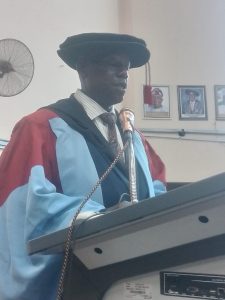

A Professor of Law at the University of Ilorin, Mahmud Kayode Adebayo, has called for the establishment of a specialised court that would handle cases related to the reproductive rights of women in Nigeria.
 Prof. Adebayo, who delivered the University’s 265th inaugural lecture, said the current Family Court is not adequately addressing critical issues, such as marital rape, widowhood rites, and other forms of gender-based violence, pointing out that women and girls deserve the autonomy to make decisions about their bodies, including the right to determine when or whether to have children, seek medical care, and live free from coercion or violence.
Prof. Adebayo, who delivered the University’s 265th inaugural lecture, said the current Family Court is not adequately addressing critical issues, such as marital rape, widowhood rites, and other forms of gender-based violence, pointing out that women and girls deserve the autonomy to make decisions about their bodies, including the right to determine when or whether to have children, seek medical care, and live free from coercion or violence.
The inaugural lecturer, who opined that a dedicated court would provide women with a more effective avenue for seeking justice, sought legal and policy reforms to protect and uphold women’s reproductive rights in the country.
Prof. Adebayo stressed the need to grant women full autonomy over decisions concerning their bodies, particularly their right to choose when and whether to become pregnant.
He faulted the country’s existing legal framework for failing to adequately protect women’s reproductive health rights and called for significant constitutional reforms to address these gaps.
Prof. Adebayo called for an amendment to Chapter V of the Constitution, which addresses Fundamental Human Rights, to explicitly include women’s reproductive rights as enforceable socio-cultural rights, adding that in the alternative a separate chapter dedicated exclusively to these rights can be created in future constitutional amendments.
Prof. Adebayo also emphasised the need for free access to essential services for women, including healthcare and legal support, to combat gender-based violence and harmful traditional practices, such as female genital mutilation.
In addition, the inaugural lecturer stressed the need for public awareness campaigns to educate women on their reproductive rights, as well as stronger partnerships between the government and non-governmental organisations (NGOs) for reproductive health advocacy.
He said: “Organisations such as the Women Aid Collective (WACOL), the Association for Reproductive and Family Health (ARFH), and the Federation of Muslim Women’s Associations of Nigeria (FOMWAN) are already doing commendable work in promoting women’s reproductive health rights. However, stronger partnerships between governmental and non-governmental bodies are essential to achieving meaningful impact.”
Prof. Adebayo also called for clearer legal frameworks to regulate family planning, contraception, and abortion, which he argued are critical to safeguarding women’s reproductive autonomy.
